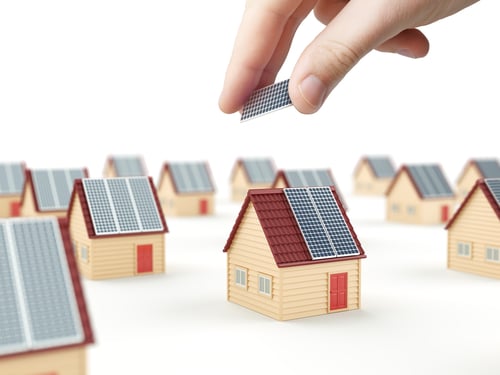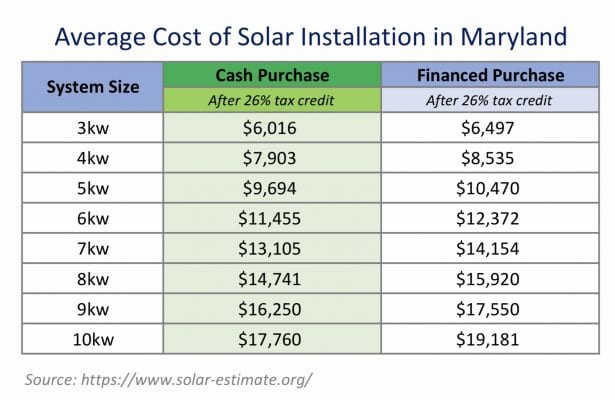
In an era focused on environmental impact, solar panels are becoming more common than ever before. Along with energy savings and environmental consciousness, there are various pros and cons to consider before going solar in investment properties. Read on as we discuss how solar energy works and potential impacts for your Montgomery County rental.
What are Solar Panels and How do they Work?
Solar panels consist of tons of smaller photovoltaic cells. In other words, these cells convert sunlight to electricity to power your home. Check out the entire process below.
How a Solar Energy System Works
- The process begins when particles of light (photons) displace electrons from atoms, creating a flow of electricity.
- Panels then convert the produced electricity to DC current
- An inverter takes the DC current and converts it to AC electricity
- The AC electricity powers your home
- Excess energy flows back to the grid through net metering
What is Net Metering?
Most households cannot use all of the energy produced during peak sunlight hours. Therefore, excess energy is returned to the power grid via a two-way meter to be used by all. Net metering refers to the tracking of energy usage and production. The homeowner receives credits based on the amount of excess energy sent back to the grid. During low light hours, homeowners can then draw on those bill credits to receive power from the grid. So, in essence, net metering allows you to store your energy for when you need it. Maryland, like many states, implements a cap on the amount of solar that can subscribe to net metering. Maryland Code §7-306 and COMAR 20.50 allows customers to net meter until the total capacity of the system reaches 1,500 MW.
Benefits of Net Metering
- Eliminates the need for a battery storage system
- No backup generator needed in times without sufficient sunlight
- Reduce or even eliminate monthly power bills
- Relieves pressure from the power grid to serve the greater good
How to Pay for Going Solar in Investment Properties
Many homeowners and landlords shy away from solar, worried about the initial cost. While there is an initial investment, the benefits of owning your system as opposed to leasing are hard to ignore. Leasing systems may seem appealing, but require you to give up control and do not offer the same savings in the long run. Read on as we examine the benefits of buying to go solar in investment properties below.

Top 3 Ways to Pay for Solar
- Cash: Buying outright is best. Tax credits can reduce overall cost plus you can reduce your electricity bill by up to 70 or even 100 percent. Additionally, most systems pay for themselves in savings in about five to seven years.
- Home Equity Loan: A home equity line of credit is a cost-effective way to finance going solar in investment properties. This option will offer more favorable interest rates, and the interest you pay is tax-deductible.
- Solar Loan: Many solar companies offer financing thanks to the relationships they have with lenders. However, since these loans are unsecured, interest rates are higher, and the interest is not tax-deductible. They may also be subject to high origination fees.
Benefits of Going Solar in Investment Properties
Most people are aware of the savings on energy costs that solar panels can provide, but is that it? Before investing in a solar energy system, consider the long-term benefits below to decide if this is right for you.
- Increased Home Value: Solar panels increase the resale value of your home and are appealing to potential buyers. Estimates show that a possible increase in value can be as much as $4000 to $5000 per kilowatt of panels installed. Overall, a home with solar selling price is around 3.74% higher than non-solar homes.
- Appealing Savings for Renters: Renters must consider utility costs when searching for a home. The added savings of solar energy is a massive plus to potential renters. Solar panels create a valuable upgrade similar to renovated kitchens or luxury baths.
- Rent Homes Faster: Energy saving is a huge marketing boost for advertising your rental home. Thanks to this added savings incentive, your home will likely rent faster than a similar home without solar.
- Save More with Tax Credits: Tax credits at state and federal levels can significantly reduce the initial investment costs. The savings will quickly outweigh the cost and provide a nice return on investment.
Factors that Influence Solar Value in Gaithersburg, MD
- Region of the country
- The local price of electricity
- Solar installation prices
- System replacement value
- Frequency of power outages
- Amount of energy generation
- State incentives
- Local understanding of solar technology and benefits
- Homeowner/Seller Incentives for Installing Solar Panels
- Federal solar investment tax credit (ITC)
Are solar benefits worth the cost in your Montgomery County rental property? That depends on your long-term financial goals, but it is worth considering. Weighing the various pros and cons above will help you determine the best route for going solar in investment properties. If you’re considering adding solar to your Gaithersburg investment property, a Montgomery County property management firm can advise you on this as well as any other improvements you are considering to help make sure you get the best return on your investment.
